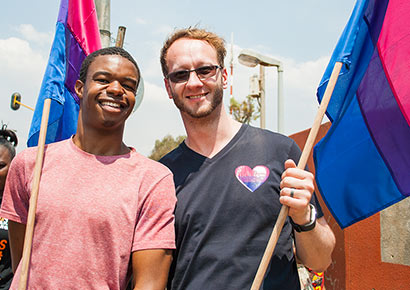March is Bisexual Health Awareness Month
 March marks Bisexual Health Awareness Month. Now in its fifth year, the US-based Bisexual Resource Center uses this social media campaign to raise awareness about bisexual health.
March marks Bisexual Health Awareness Month. Now in its fifth year, the US-based Bisexual Resource Center uses this social media campaign to raise awareness about bisexual health.
An increasing amount of recent studies are indicating that bisexuals make up the majority of the LGBTIQ+ community.
A 2013 Pew Research Center study found that of the LGBTIQ+ community (in the USA), 36% identified as gay men, 19% identified as lesbian women, 5% as transgender and 40% as bisexual.
Of the 40% self-identified bisexuals, 11% comprised of men, and 29% comprised of women. A 2015 study by YouGov.uk, a British research organisation, found that 43% of 18-24 year olds and 29% of 25-39 year olds identified as bisexual. Holistically, 72% of the British public place themselves at the completely heterosexual end of the scale, while 4% put themselves at the completely homosexual end and 19% say they are somewhere in between.
Yet, bisexuals are at higher risk of physical and mental health disparities and even startling social and economic disparities, than gay or lesbian people. According to research by the Movement Advancement Project, and promoted by Paves on social media, the following distressing statistics came to light:
- Bisexual women and men are at higher risk of living in poverty than straight people, or gay and lesbian people. (Gay men and lesbians are at lower risk of living in poverty than straight women.)
- Only about 30% of bisexualS are out to important people in their lives, as compared to more than 70% of gay men and lesbian women
- Bisexuals are 4 times more likely to commit suicide compared to straight people, whereas gay men and lesbian women are two times more likely to commit suicide compared to straight people.
- 1 in 4 bisexuals have never told anyone they are bisexual (25%), whereas only 4% of gay men and lesbian women have never told anyone they are gay.
- 1 in 5 bisexuals report experiencing a negative employment decision based on their sexuality
While all these statistics show that bisexuals make up the majority of the LGBTIQ+ community, and that they are at higher risk of mental and physical issues, a recent article in the Washington Post found that funding to LGBT organisations from 1970 to 2010, totaled US$487 million and went to programmes that serve all LGBTIQ+ people. Only US$84,000 went to organisations that specifically served bisexuals.
Social isolation is a serious concern within the LGBTIQ+ community. When someone doesn’t know many – or any – other people going through the same identity crisis, that person can feel isolated and stigmatised. The fact that bisexuals are often the most forgotten minority of the LGBTIQ+ community just exacerbates feelings of isolation.
That is why I started amBi South Africa, a social and support community for bisexuals, our friends and allies. amBi South Africa’s mission is to build a vibrant and visible bisexual community here in Gauteng, and hopefully the rest of South Africa when we’re more established. amBi is a diverse social group that hosts public and private events and activities.
I want other bisexuals to feel the same liberation, freedom and self-acceptance I have experienced throughout my coming out process and the acceptance of bisexuality, as part of a community and with the necessary tools in the form of a support group.
There are so many people that are bisexual, closeted, stigmatised and isolated. Most of them probably still feel alone. Whether you’re newly coming out or a veteran bi activist, there comes a point when it’s time to stop talking about abstractions and to start living as bi people.
It is often easy to forget that our sexuality is ultimately about how we love. That sexuality is about love – a love that transcends the boundaries of sex and gender. It is not up to others to give us the affirmation all humans need. It is up to us to give that acceptance, love, and respect to ourselves and to each other and then build upon that foundation together.
If you are interested in joining amBi South Africa, please register on meetup.com at www.meetup.com/amBiJNB/. Listen below to Werner Pieterse, founder of amBi South Africa, on Cliff Central’s Sex Talk disusing bisexuality.
- Facebook Messenger
- Total267
Leave a Reply